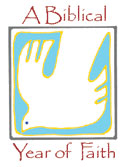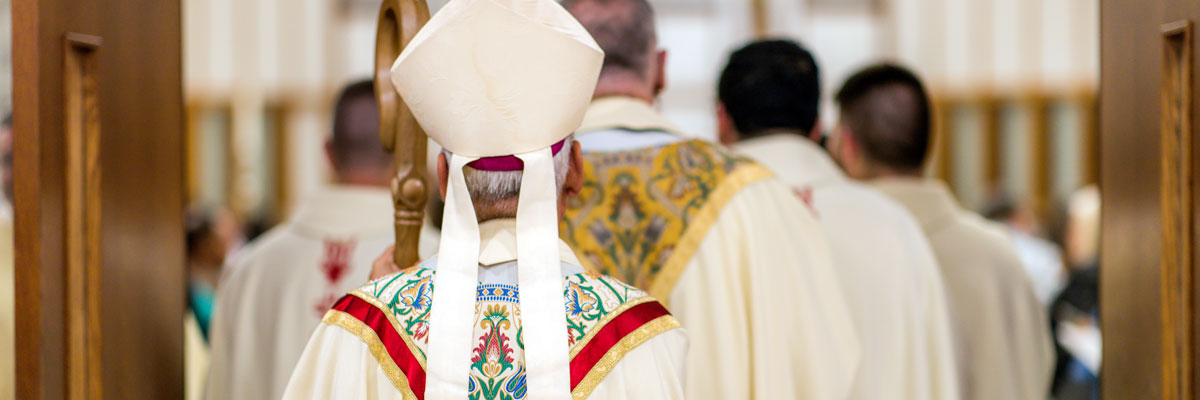Official Website of the
Catholic Diocese of Little Rock
All Scripture heralds Good News of Christ
Published: November 10, 2012
This is the second column in a 14-part series
By Clifford M. Yeary
Associate Director, Little Rock Scripture Study
This Year of Faith calls us to enrich our faith in Christ. By no coincidence the Year of Faith comes to us upon the 50th anniversary of the opening of the Second Vatican Council, a council dedicated to the renewal of the Church and our Christian witness in the context of the modern world. The vision for renewal is clearly found in the 16 documents of Vatican II and the riches of our faith are explored in depth in the Catechism of the Catholic Church.
 It is in Sacred Scripture, however, that the deepest roots of faith will always draw from the wellspring of new life in Christ. In the Book of Acts, in the testimony of Stephen, our faith's first martyr, we discover something of the biblical panorama awaiting those who turn to Scripture as part of a biblical year of faith (Acts 6:8–7:60).
It is in Sacred Scripture, however, that the deepest roots of faith will always draw from the wellspring of new life in Christ. In the Book of Acts, in the testimony of Stephen, our faith's first martyr, we discover something of the biblical panorama awaiting those who turn to Scripture as part of a biblical year of faith (Acts 6:8–7:60).
Stephen is one of seven Greek-speaking Jewish followers of Christ whom the apostles set aside as special ministers to the Greek-speaking widows of the community. In theory, the service of these new "deacons" would free up time for the apostles to preach and teach (Acts 6:1-6). From Stephen's example, however, and Phillip's as well (Acts 8:4-8, 26-40), we quickly realize that they are as vigorous preachers, teachers and healers as the apostles themselves.
When false witnesses press charges of blasphemy against Stephen before the Sanhedrin — the same religious court that heard charges against Jesus — Stephen answers the charges by summarizing the religious experience of the Jewish people. Filled with the Holy Spirit, he retells, in effect, the story of the Old Testament.
Stephen is a faith-filled witness to the new life he experiences in Christ. Deeply familiar with Sacred Scripture, he knows his faith is greater than life itself.
At this point in Acts the followers of Jesus are not even called Christians yet. Outsiders refer to them as Nazoreans (Acts 24:5), and they probably referred to themselves as followers of "the Way" (Acts 9:1-2). They have no Bible other than the same Sacred Scriptures revered by other Jewish people. But they are firm in their belief that these Scriptures (which we now refer to as the Old Testament) point to Christ in everything they teach.
Stephen, however, nowhere actually quotes Scripture. His familiarity with Scripture combined with his faith in Christ and his faithfulness to the apostles' teaching enables him to interpret Scripture. Beginning with Abraham, and highlighting the faithfulness of the patriarchs, Moses, Joshua, David, Solomon and the prophets, he presents an understanding of Scripture that ascribes faithlessness to those who are charging Stephen with blasphemy.
It would be an understatement to say Stephen's interpretation of Israel's story of faith was shocking to his audience. They respond by stoning him to death. Stephen's killers knew Scripture quite well. Even Saul of Tarsus (the future Apostle Paul), who was a well-schooled rabbi, is in complete agreement with Stephen's killing. What these pious men couldn't believe was that their ancient record of faith could be pointing them to a new dimension of belief, a new focus for their faith, in their present moment.
The new dimension of faith that Stephen finds in Scripture is its capacity to proclaim Jesus of Nazareth as Messiah (Christ) and Lord. His ability to understand Scripture in this fashion is something Luke (author of Acts) ascribes with certainty to Jesus himself as its source (Luke 24:44-46). It was Jesus who opened the minds of the apostles to understand Scripture.
This gift has never been lost to the Church, but it is also one that requires exercising through faithful study. God's word has the power to speak to the very depths of our souls. Delving deeply into both the Old and New Testaments during this Year of Faith will build our faith for years to come.
As Pope Benedict XVI stated in "Verbum Domini": "I wish to encourage all the people of God, pastors, consecrated persons, and the laity, to become increasingly familiar with the Sacred Scriptures. We must never forget that all authentic and living Christian spirituality is based on the word of God pro-claimed, accepted, celebrated and meditated upon in the Church."
Study Questions
- What were the followers of Jesus called in the first years following his resurrection?
- Both his accusers and Stephen believe in the Scriptures. How has Stephen's interpretation of the Old Testament upset them?
- Where in the Old Testament have you found nourishment for your faith in Christ?
- Why did the apostles choose the first seven for diaconal service (Acts 6:1-6)? What ministry do we read of them actually performing (Acts 6:8–7:60; 8:4-8, 26-40)?
This article was originally published in Arkansas Catholic Nov. 10, 2012. Copyright Diocese of Little Rock. All rights reserved. This article may be copied or redistributed with acknowledgement and permission of the publisher.









